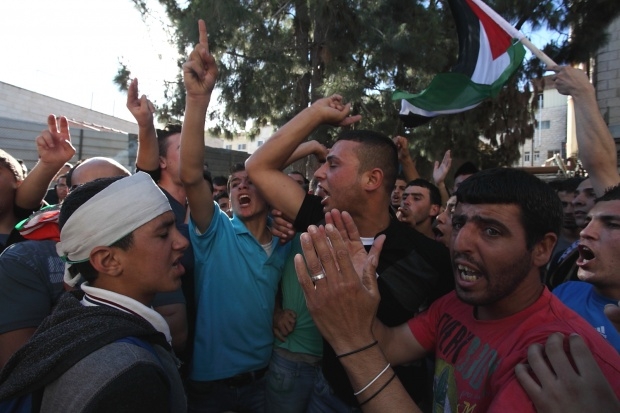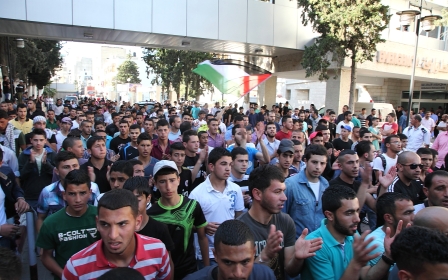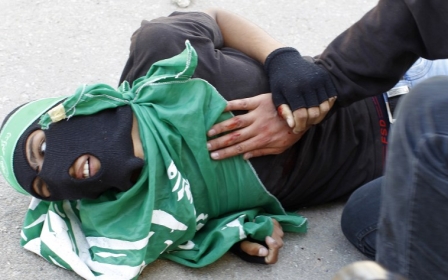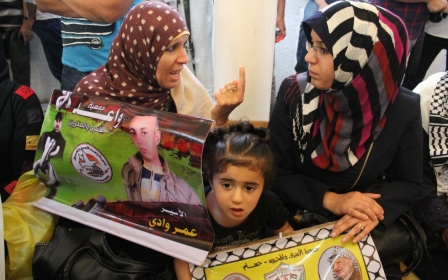Israeli soldier suspended following Palestinian teens' deaths

As investigations into the killing of two Palestinian teenagers at a Nakba Day protest earlier this month continue, an Israeli army soldier who allegedly fired a rubber bullet during the incident has been suspended, according to Israeli newspaper Haaretz.
The suspended individual is a member of the Israeli army communications division and, as a non-combat soldier, is unauthorised to use weapons unless shot at or under direct threat. A CNN video clip released earlier this week appears to show that a soldier fired a rubber bullet around the same time Nadim Nuwara, 17, was shot. The Israeli army, however, says it has found no evidence connecting the soldier with Nuwara's death, Haaretz reported.
Reports of the suspension comes as Nuwara's family has told news media that they discovered a bullet in their son's blood-covered backpack. A ballistics expert has identified the bullet as a "Razor Core", described by its manufacturer as one designed for "superior accuracy, effective stopping power and extended range", and a type currently used by the Israeli army, according to an Electronic Intifada report.
Questions have also been raised about the way in which Israeli army soldiers are loading rubber-coated bullets into their guns. Rubber bullets are legal to use by trained soldiers from a specified distance. However, a Haaretz report this week suggests that some soldiers - in a violation of the forces' regulations - have been inserting the bullets into the adapter on their rifle muzzles to cause more harmful effects.
Twenty-one Palestinians have been killed after being shot with rubber-coated metal bullets since the state of the second intifada in September 2000, according to Israeli human rights NGO B'Tselem. During the second intifada, reports emerged of Israeli army specialists from units that were unattached to operational forces, like drivers and dog handlers, behaving inappropriately, Haaretz reported. Because specialists are not fully subordinate to field commanders, but are far from their unit commanders at base, they can be harder to supervise, the newspaper reported.
Nawara, 17, and Mohammad Mahmoud Odeh, 16, reportedly died in or en route to a Ramallah hospital after they were both shot in the chest on 15 May during the protest near Ofer military prison.
A 15-year-old, Mohammad Abdullah Hussein al-Azzeh, was shot in the back and left lung, and is currently in a stable condition at the Ramallah Medical Complex, according to Defence for Children International-Palestine, one of the organisations which released video footage of the incident.
The shootings triggered international outrage when at least two human rights organisations released CCTV footage which appeared to show that neither of the teenagers had been armed or posed an immediate threat to Israeli soldiers.
The UN called for an "independent and transparent" investigation into the shooting. Assistant UN secretary general for political affairs Oscar Fernandez-Taranco urged Israel to "ensure its security forces strictly adhere to the basic principles on the use of force and firearms by law enforcement officials."
"Israel's use of excessive and indiscriminate violence and live ammunition at non-violent Palestinian demonstrations constitutes war crimes and crimes against humanity under international law," Palestinian Liberation Organisation's Hanan Ashrawi said.
Israel has said the border police had tried to quell a violent demonstration by about 150 Palestinians.
The protest demanded the release of thousands of Palestinians held by Israel and came as around 100 prisoners had been on strike for more than a month in protest at their confinement in prisons without charge or trial and press for their release. Under Israel's administrative detention law, military commanders can order the detention of West Bank Palestinians for terms up to six months, which can be renewed indefinitely.
On Wednesday, 40 of the inmates who are taking part in the hunger strike now for more than a month were hospitalised in "reasonable" condition, according to Israel's Prison Service spokesperson Sivan Weizman. However, Popular Front for the Liberation of Palestine's Ahmed Saad’at, who is also one of the hunger strikers, warned that several prisoners may die as a result of the strike.
Middle East Eye propose une couverture et une analyse indépendantes et incomparables du Moyen-Orient, de l’Afrique du Nord et d’autres régions du monde. Pour en savoir plus sur la reprise de ce contenu et les frais qui s’appliquent, veuillez remplir ce formulaire [en anglais]. Pour en savoir plus sur MEE, cliquez ici [en anglais].




